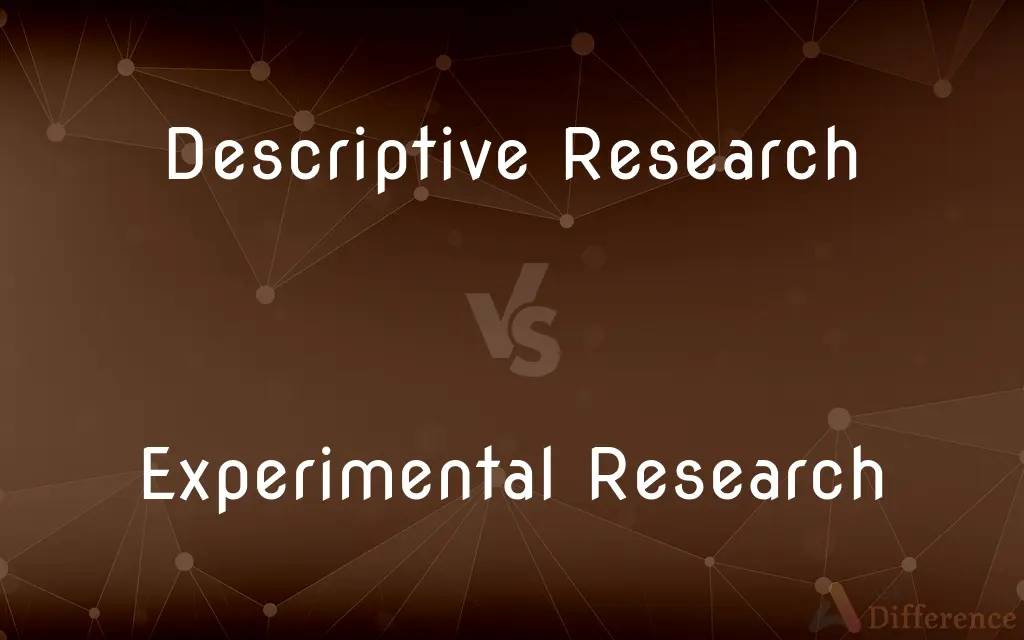Descriptive Research vs. Experimental Research — What's the Difference?
Edited by Tayyaba Rehman — By Fiza Rafique — Published on December 23, 2023
Descriptive Research observes and describes phenomena as they exist, while Experimental Research manipulates variables to determine cause and effect.

Difference Between Descriptive Research and Experimental Research
Table of Contents
ADVERTISEMENT
Key Differences
Descriptive Research aims to depict the characteristics or behaviors of subjects without influencing them. In contrast, Experimental Research intentionally changes one or more variables to ascertain the effects on another variable.
While Descriptive Research provides a snapshot of the current state or condition, Experimental Research delves into determining relationships between variables and predicting outcomes.
Techniques like surveys and case studies are often utilized in Descriptive Research to capture data in its natural setting. On the other hand, Experimental Research typically employs controlled environments, such as labs, ensuring the manipulation of specific variables.
Descriptive Research offers insights into "what" or "how often" a phenomenon occurs, granting a foundation for further study. Conversely, Experimental Research answers "why" a phenomenon occurs by investigating the interactions between variables.
The nature of Descriptive Research means it's primarily observational, yielding descriptive data. In contrast, Experimental Research is more structured and can provide evidence for causation between variables.
ADVERTISEMENT
Comparison Chart
Purpose
Observe and describe subjects
Investigate relationships and cause-effect among variables
Methodology
Observational, non-manipulative
Manipulative, controlled
Outcome
Provides description of phenomena
Determines causality between variables
Environment
Natural setting
Often controlled settings like labs
Data Type
Descriptive data
Causal data
Compare with Definitions
Descriptive Research
Research that observes and describes subjects without influencing them.
A study observing the daily routines of remote workers is Descriptive Research.
Experimental Research
Delving into cause and effect relationships between variables.
Determining how temperature variations affect battery performance embodies Experimental Research.
Descriptive Research
A method focused on portraying the characteristics or behaviors of phenomena.
Surveying customer preferences about a product falls under Descriptive Research.
Experimental Research
Research that aims to predict outcomes based on variable manipulation.
Examining the effects of sleep duration on cognitive performance is Experimental Research.
Descriptive Research
An observational approach that presents a detailed account of a subject.
Researching the cultural practices of a tribe through observation is Descriptive Research.
Experimental Research
A research method that manipulates variables to determine causality.
Investigating the effect of light on plant growth is Experimental Research.
Descriptive Research
Gathering data to depict a scenario or condition without manipulation.
A census that collects demographic details employs Descriptive Research.
Experimental Research
Structured investigation where one or more variables are changed to observe effects.
Analyzing how different diets impact weight loss over time is Experimental Research.
Descriptive Research
A non-experimental method that captures data in its genuine context.
Mapping the migration patterns of birds through seasonal observations is Descriptive Research.
Experimental Research
Research employing controlled conditions to investigate variable interactions.
Testing a new drug's efficacy against a placebo in a lab setting is Experimental Research.
Common Curiosities
Why choose Descriptive Research?
It offers a foundational understanding of a subject, paving the way for further investigations.
How does Experimental Research differ?
Experimental Research investigates cause and effect by manipulating variables.
What's the primary aim of Descriptive Research?
It focuses on observing and depicting phenomena in its natural context.
What are common methods in Experimental Research?
Controlled experiments, including randomized controlled trials, are typical.
Are case studies a form of Descriptive Research?
Yes, case studies offer detailed observations about a specific subject or scenario.
Can one conduct Descriptive Research using surveys?
Yes, surveys are a common tool in Descriptive Research to gather data.
Can Descriptive Research lead to Experimental Research?
Yes, after observing a phenomenon descriptively, one might investigate causally using experimental methods.
What are the limitations of Descriptive Research?
It can't determine causality and might be influenced by subjective biases.
Does Experimental Research always provide clear results?
Not always. External factors and unforeseen variables can influence outcomes.
Can Descriptive Research determine causality?
No, it only describes phenomena. For causality, one would turn to Experimental Research.
Is Experimental Research always conducted in labs?
Not always, but controlled environments are common to ensure variable manipulation.
Why is control crucial in Experimental Research?
Control ensures only the intended variables are manipulated, yielding clearer results about causality.
What's a key advantage of Experimental Research?
It can provide evidence for cause and effect relationships between variables.
What's crucial for success in Experimental Research?
A well-designed experiment with clear variable definitions and controlled conditions is vital.
How is Descriptive Research data typically presented?
Often through charts, graphs, or detailed accounts to portray observations.
Share Your Discovery

Previous Comparison
SU-27 vs. MIG-29
Next Comparison
Aardvarks vs. AnteatersAuthor Spotlight
Written by
Fiza RafiqueFiza Rafique is a skilled content writer at AskDifference.com, where she meticulously refines and enhances written pieces. Drawing from her vast editorial expertise, Fiza ensures clarity, accuracy, and precision in every article. Passionate about language, she continually seeks to elevate the quality of content for readers worldwide.
Edited by
Tayyaba RehmanTayyaba Rehman is a distinguished writer, currently serving as a primary contributor to askdifference.com. As a researcher in semantics and etymology, Tayyaba's passion for the complexity of languages and their distinctions has found a perfect home on the platform. Tayyaba delves into the intricacies of language, distinguishing between commonly confused words and phrases, thereby providing clarity for readers worldwide.












































